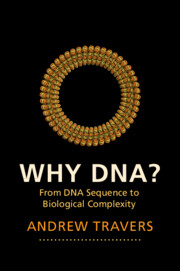Book contents
- Why DNA?
- Frontispiece
- Why DNA?
- Copyright page
- Contents
- Preface
- Acknowledgements
- 1 The Perennial Question
- 2 The Nature of Biological Information
- 3 DNA
- 4 The Evolution of Biological Complexity
- 5 Cooperating Genomes
- 6 DNA, Information and Complexity
- 7 Origins of Complexity
- 8 The Complexity of Societies
- 9 Why DNA
- General Reading and Bibliography
- Index
5 - Cooperating Genomes
Published online by Cambridge University Press: 05 May 2022
- Why DNA?
- Frontispiece
- Why DNA?
- Copyright page
- Contents
- Preface
- Acknowledgements
- 1 The Perennial Question
- 2 The Nature of Biological Information
- 3 DNA
- 4 The Evolution of Biological Complexity
- 5 Cooperating Genomes
- 6 DNA, Information and Complexity
- 7 Origins of Complexity
- 8 The Complexity of Societies
- 9 Why DNA
- General Reading and Bibliography
- Index
Summary
Almost by definition, increases in biological complexity, whether at the molecular or cellular levels, or even at the level of species diversity, imply an increase in the effective information content of DNA in the system as a whole. An important question, which goes to the heart of the concept of biological complexity, is to ask to what extent any diversity-associated increases in information content are essentially discrete or are part of a continuum in which the evolution of complex biological systems is linked to incremental accretions of DNA information.
- Type
- Chapter
- Information
- Why DNA?From DNA Sequence to Biological Complexity, pp. 128 - 142Publisher: Cambridge University PressPrint publication year: 2022



